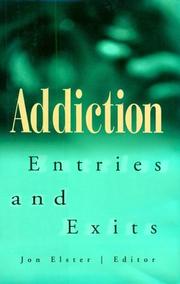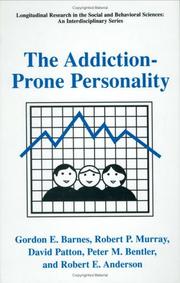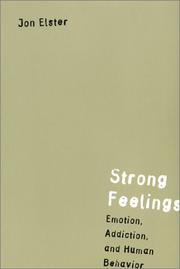| Listing 1 - 4 of 4 |
Sort by
|

ISBN: 0871542358 9780871542359 Year: 1999 Publisher: New York (N.Y.) : Russell Sage Foundation,
Abstract | Keywords | Export | Availability | Bookmark
 Loading...
Loading...Choose an application
- Reference Manager
- EndNote
- RefWorks (Direct export to RefWorks)
Addicts --- Substance abuse --- Self-control. --- Psychology. --- Etiology. --- Addicts - Psychology. --- Substance abuse - Etiology.
Book
ISBN: 0123983630 1299137369 012398338X 9780123983633 9780123983381 9781299137363 Year: 2013 Publisher: San Diego : Academic Press,
Abstract | Keywords | Export | Availability | Bookmark
 Loading...
Loading...Choose an application
- Reference Manager
- EndNote
- RefWorks (Direct export to RefWorks)
Interventions for Addiction examines a wide range of responses to addictive behaviors, including psychosocial treatments, pharmacological treatments, provision of health care to addicted individuals, prevention, and public policy issues. Its focus is on the practical application of information covered in the two previous volumes of the series, Comprehensive Addictive Behaviors and Disorders. Readers will find information on treatments beyond commonly used methods, including Internet-based and faith-based therapies, and criminal justice interventions. The volume features
Drug addicts. --- Recovering addicts. --- Substance abuse -- Etiology. --- Substance abuse -- Treatment. --- Mental Disorders --- Diseases --- Compulsive Behavior --- Impulsive Behavior --- Psychiatry and Psychology --- Behavior --- Behavior and Behavior Mechanisms --- Substance-Related Disorders --- Behavior, Addictive --- Psychiatry --- Health & Biological Sciences --- Substance Abuse Disorders --- Substance abuse --- Crisis intervention (Mental health services) --- Patients --- Rehabilitation. --- Treatment. --- Crisis intervention (Psychiatry) --- Emergency mental health services --- Intervention, Crisis (Mental health services) --- Brief psychotherapy --- Mental health services --- Psychiatric emergencies

ISBN: 9780306462498 0306462494 9780306471766 9786610207299 1280207299 0306471760 Year: 2000 Publisher: New York, New York : Kluwer Academic/Plenum Publishers,
Abstract | Keywords | Export | Availability | Bookmark
 Loading...
Loading...Choose an application
- Reference Manager
- EndNote
- RefWorks (Direct export to RefWorks)
The production of this book represents a culmination for me of some 25 years of interest in the field of personality and substance use and abuse. In choosing the field of substanceuse and abuse for the focus of our research, all of the investi- tors collaborating in this research have been sustained by the awareness that the work we are doing has an important purpose. Substance abuse continues to have enormous impacts on individuals and families,and prevention and treatment - proaches developed to date have not always been as successful as we would hope to see. New advances in our fundamental understanding of the causal mec- nisms involved in the development ofaddiction may be necessary to advance our success in developing new forms of prevention and treatment for alcohol and drug abuse. The work in this book builds on the work of numerous previous investi- tors who have been drawn to investigate this topic. As you will notice in the extensive reference list, there have been hundreds of articles published on this topic. Although each of these references has added a small piece to our und- standing of the relationship between personality and alcohol abuse, the majority of these studies have been done on clinical samples and often involved no control groups or poorly matched control groups. Several important previous longitu- nal investigations have been conducted,but these investigations have usually not included general population samples or comprehensivepersonality test batteries.
Substance abuse --- Personality. --- Personnalité --- Etiology. --- Substance abuse -- Etiology. --- Personality --- Behavior and Behavior Mechanisms --- Mental Disorders --- Diseases --- Psychiatry and Psychology --- Substance-Related Disorders --- Psychiatry --- Health & Biological Sciences --- Substance Abuse Disorders --- Etiology --- Orthopedagogiek --- alcoholisme en drugsverslaving --- alcoholisme en drugsverslaving. --- Psychology. --- Child psychology. --- School psychology. --- Child and School Psychology. --- Personal identity --- Personality psychology --- Personality theory --- Personality traits --- Personology --- Traits, Personality --- Psychology --- Individuality --- Persons --- Self --- Temperament --- Developmental psychology. --- Psychology, School --- Psychology, Applied --- Behavior, Child --- Child behavior --- Child study --- Children --- Pediatric psychology --- Child development --- Developmental psychology --- Alcoolisme --- Personnalité --- Toxicodependance --- Traitement

ISBN: 0262550369 0262050560 0262272318 0585077738 0262262541 9780262272315 9780262262545 9780262550369 Year: 1999 Volume: 1997 Publisher: Cambridge (Mass.) : MIT press,
Abstract | Keywords | Export | Availability | Bookmark
 Loading...
Loading...Choose an application
- Reference Manager
- EndNote
- RefWorks (Direct export to RefWorks)
Emotion and addiction lie on a continuum between simple visceral drives such as hunger, thirst, and sexual desire at one end and calm, rational decision making at the other. Although emotion and addiction involve visceral motivation, they are also closely linked to cognition and culture. They thus provide the ideal vehicle for Jon Elster's study of the interrelation between three explanatory approaches to behavior: neurobiology, culture, and choice.The book is organized around parallel analyses of emotion and addiction in order to bring out similarities as well as differences. Elster's study sheds fresh light on the generation of human behavior, ultimately revealing how cognition, choice, and rationality are undermined by the physical processes that underlie strong emotions and cravings. This book will be of particular interest to those studying the variety of human motivations who are dissatisfied with the prevailing reductionisms.
Emotions --- Addicts --- Compulsive behavior --- Substance abuse --- Choice (Psychology) --- Psychology --- Etiology --- -Choice (Psychology) --- -Emotions --- Addicted persons --- Addictive persons --- #SBIB:309H505 --- 316.6 --- Feelings --- Human emotions --- Passions --- Affect (Psychology) --- Affective neuroscience --- Apathy --- Pathognomy --- 316.6 Gedragstheorie. Sociaal gedrag. Sociale psychologie --(gedrag en zelfconcept van het individu in de groep z.o. {159.923.33}) --- Gedragstheorie. Sociaal gedrag. Sociale psychologie --(gedrag en zelfconcept van het individu in de groep z.o. {159.923.33}) --- Addictive behavior --- Behavior, Compulsive --- Compulsion (Psychology) --- Impulse --- Psychology, Pathological --- Obsessive-compulsive disorder --- Sick --- Code en boodschap: psychologische, psycho-analytische benadering --- Choice (Psychology). --- Emotions. --- Psychology. --- Etiology. --- COGNITIVE SCIENCES/General --- COGNITIVE SCIENCES/Psychology/Cognitive Psychology --- Addicts - Psychology --- Compulsive behavior - Etiology --- Substance abuse - Etiology
| Listing 1 - 4 of 4 |
Sort by
|

 Search
Search Feedback
Feedback About UniCat
About UniCat  Help
Help News
News